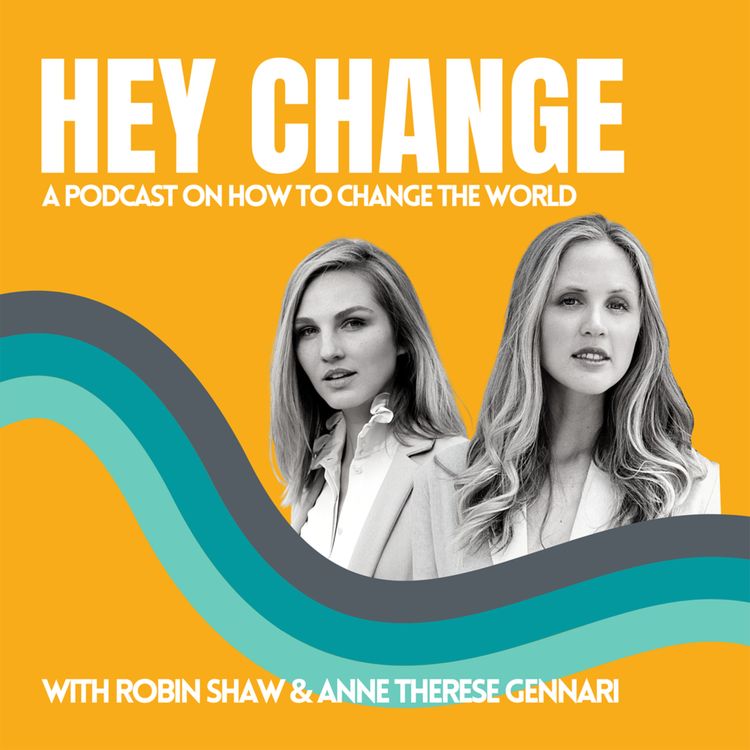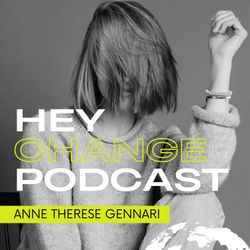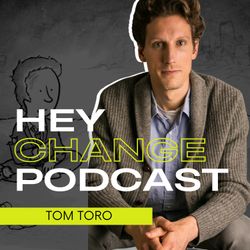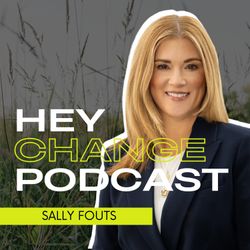Share

Hey Change Podcast
E93. How To Heal Ourselves to Heal The Planet
Can climate grief and anger be catalysts for transformational healing? Is there such a thing as healthy denial? And how can we learn to work with our emotions in a way where our hearts break open and use that to serve ourselves, others, and the world? Those are only a few of the things we get into in our beautiful conversation with Jack!
In this episode:
- How to pay attention to our fear, anger, and anxiety to let it empower you
- The mental health work required to be a climate optimist
- Healthy guilt and healthy denial
- How to grow from shame
- Why resilience is an act of resistance
Mentioned in the episode:
- Online climate community): www.collectvexaction.com
- Weekly support calls - contact: https://livingresilience.net/safecircle/
- Don't Look Up Action Network: https://dontlookup.count-us-in.com/
Jack Adam Weber is an award-winning author for environmental and social justice, a licensed acupuncturist and Chinese medical herbalist, celebrated poet, certified yoga and Qi Gong instructor, climate activist, mental health advocate, and permaculture farmer. His latest book, Climate Cure: Heal Yourself to Heal the Planet, goes into depth about the healing work we’re here to take on as individuals to grow emotional resilience and become forces to be reckoned with in this world.
Website: https://jackadamweber.com/
Instagram: @jackadamweber
CONNECT + FOLLOW:
Podcast Instagram: @heychange_podcast
Hosts: @annetheresegennari + @robinxshaw
Podcast website: www.theclimateoptimist.com/hey-change-podcast
Website: www.heychangepodcast.com
Follow us on Instagram: https://www.instagram.com/heychange_podcast/
Host: https://www.instagram.com/annetheresegennari/
Hosted by The Climate Optimist: https://www.theclimateoptimist.com/
Music produced by Jackson Whalan
More episodes
View all episodes

112. Nature Is Nonpartisan: Reclaiming Conservation as a Shared American Value
35:34|Why is it that nature and climate change have become such difficult topics to talk about, especially with people with different political viewpoints than us? Why is climate change so politicized, and how can we come back to the fact that we all, truly, deep inside, care about the same things? That is the guiding mission behind Nature Is Nonpartisan, a new nonprofit working to restore conservation as a unifying, bipartisan American value. In this episode, I sit down with Amelia Joy, Executive Director of NINP, to unpack why environmentalism has become so politically charged, why fewer people identify as “environmentalists” today, and how we can bring nature back to the center of public life — not as a partisan wedge, but as common ground.As we’re heading into the holiday season, I couldn’t think of a more important topic to dive into. As Katharine Hayhoe, a former guest on our show, shares over and over again, the most important thing we can do for climate change is talk about it. But how do we talk about it? How do we find the courage to bring up these topics, and how do we make sure the conversation actually leads us to someplace good? If you’re hoping to put nature and our shared future on the table this year, without risking completely wrecking the family party, I hope Amelia and I can provide some pointers.
111. Holding Space for All Climate Emotions: Anger, Grief, and the Power of Inner Work
39:31|In this special episode, Anne Therese brings back two of the most impactful conversations from the Hey Change archives — featuring Mike Veny, mental health speaker and advocate, and Jack Adam Webber, author of Climate Cure.As the days get darker and we naturally turn inward, this episode invites listeners to explore the often-overlooked emotional dimension of climate work. Anne reflects on how feelings like anger, grief, anxiety, and fear are not obstacles but essential tools for our personal and collective healing.With Mike Veny, we learn how anger can be a superpower — a source of clarity, leadership, and decisive action when approached with curiosity instead of shame. With Jack Adam Webber, we dive deeper into embodied grief and emotional grounding, discovering how feeling our feelings is an act of resistance, reconnection, and regeneration.This episode is a reminder that climate optimism is not blind positivity — it’s a courageous willingness to feel deeply and act from a place of wholeness, compassion, and inner alignment.Mentioned in the episodeThe Climate Optimist Cohort: https://www.theclimateoptimist.com/cohortThe Climate Optimist Leadership Retreat: https://www.theclimateoptimist.com/retreat-el-salvadorEpisode 93 with Jack Adam Weber: https://www.heychangepodcast.com/episodes/93-how-to-heal-ourselves-to-heal-our-planetEpisode 94 with Mike Veny: https://www.heychangepodcast.com/episodes/94-anger-for-goodJack's book: Climate Cure: https://jackadamweber.com/climate-cure/
110. The Climate Optimist Venn Diagram: How to Turn Hope into A Practice for Change
30:00|What does it really mean to practice optimism in the face of the climate crisis? In this episode, I break down my signature Climate Optimist Venn Diagram — a simple yet powerful framework built on three essential pillars: inner development, taking action, and community.You’ll learn how optimism isn’t an attitude you simply choose — it’s something you grow through daily practice. I'll share how emotional resilience, meaningful action, and collective care work together to nurture true hope, empower lasting change, and even trigger the body’s “feel-good” hormones that keep us motivated.Whether you’re an educator, changemaker, business leader, or someone searching for renewed energy in your climate journey, this episode will inspire you to show up with purpose and joy. Ready to become a climate optimist? Here's how you get started!Resources mentioned:Download The Climate Optimist Venn DiagramLearn more about the Inner Development Goals (IDGs)Explore the Climate Optimist Retreat in El SalvadorConnect for speaking or workshops at theclimateoptimist.com/speakerBook chapter mentioned in The Climate Optimist Handbook: 41 - 43Book by Jack Adam Weber: Climate CureEpisode 104: The 3 Narrative ShiftsEpisode 96 with Charlie Sellars from Microsoft
109. Turning Deserts into Forests and Finding Hope in Restoration with James Godfrey-Faussett
40:18|Today’s episode is such a special one. I’m joined by James Godfrey-Faussett, a restoration ecologist and founder of the Healing Earth Project, who has spent over two decades bringing degraded land back to life — from city forests to desert landscapes.James shares what he’s learned from observing nature: that restoration doesn’t have to be complicated, that the Earth already knows how to heal if we give her the chance, and that slowing down might actually be the most powerful climate action we can take. He explains why observation is the first step to healing, how microbiology and fungi are the hidden engines of restoration, and why simplicity and community may be our greatest tools in the age of technology.This episode is a beautiful reminder that optimism isn’t naive — it’s rooted in what nature shows us every day: resilience, patience, and the possibility of renewal.So find a quiet spot, take a deep breath, and join us for this conversation on healing the Earth. And it starts, quite fittingly, by listening.Follow + Connect with James on LinkedIn: James Godfrey-Faussett
108. Katharine Hayhoe on How to Talk About Climate Change with Love, Not Fear
54:21|Today, I’m bringing back one of my all-time favorite episodes from the archives of Hey Change. This conversation is between my former co-host Robin and me, along with Katharine Hayhoe, an atmospheric scientist, communicator, and one of the most inspiring voices in the climate space.Even though we recorded this a few years ago, the wisdom and hope Katharine shares feel just as relevant — maybe even more so today. We dive into how to talk about climate change with people in our lives, why fear and guilt don’t work, and how we can instead use optimism, love, and connection to bring people on board.I wanted to reshare this because it’s one of those timeless conversations that reminds us that our voices matter, that hope is something we create through action, and that we already have so much in common when it comes to wanting a better future.But who is Katherine?If you don’t already know her, you’re in for such a treat. Katherine is an atmospheric scientist, the Chief Scientist at The Nature Conservancy, and the author of Saving Us, one of my favorite books on climate change. Katharine has given a TED Talk that’s been viewed by millions, she’s been named one of TIME’s 100 most influential people, and she’s truly one of the most powerful voices helping us connect climate science to our everyday lives.Follow:LinkedIn: Katherine HayhoeInstagram: @KatherineHayhoeSubstack Newsletter: Talking ClimateTED Talk: The most important thing you can do to fight climate change: talk about itBook: Saving Us - A Climate Scientist's Case for Hope and Healing in a Divided World
107. Teaching Hope: Supporting Students Through Climate Anxiety
22:01|How do we navigate climate anxiety in the classroom? This episode is a special one, and one that feels close to my heart since I struggled with climate anxiety for such a big part of my youth. Pr.. Angus, a geography teacher in the UK, reached out a while back and asked if we could please have a chat, since he kept getting questions from his students about climate change, and especially how to navigate climate anxiety, I obviously said yes and I also asked if it was okay that we recorded the conversation so that it could benefit more people, and so this is that conversation.If you’re an educator, parent, or just someone who cares about the next generation, I hope this episode will serve as a guiding light, not because it holds all the answers, but because it’s what I needed to hear all those years navigating my own fears. The biggest takeaway is that we must dare to have these conversations, and I hope this episode will leave you with both encouragement and practical ways to offer support to our children as they grow up in a changing world.I created a free guide to help you navigate climate conversations in the classroom or at home. You download it on the episode page here
106. How New Yorker Cartoonist Tom Toro Uses Humor to Talk About Climate Change
48:19|Is it OK to laugh about serious issues? If so, what role does humor play in our important work for climate justice? Let’s talk about it! Today I’m joined by Tom Toro — a celebrated cartoonist whose work has appeared over 200 times in The New Yorker and who is best known for the now-iconic climate cartoon that says, ‘Yes, the planet got destroyed, but for a beautiful moment in time we created a lot of value for shareholders.’ You may have seen it.\Known for balancing sharp observational humor with a playful, even compassionate edge, Toro also serves as chair of the Northwest Chapter of the National Cartoonist Society, and his cartoons have been a regular feature of The New Yorker since 2010. In this conversation, Tom and I talk about the power of humor to help us process hard truths, how art can spark change, and why joy and creativity are essential tools for facing the climate crisis and other societal issues. If you’ve ever wondered how a single image can capture an entire movement — this episode is for you.Tom on Instagram: @tbtoroToms’ website: https://tomtoro.com/PRE-ORDER TOM’S BOOK: https://www.simonandschuster.com/books/And-to-Think-We-Started-as-a-Book-Club/Tom-Toro/9798881604066
105. From Pledge to Progress with Sally Fouts from The Climate Pledge
35:50|Anne Therese talks with Sally Fouts, Global Lead for The Climate Pledge at Amazon, about how businesses can accelerate climate action together. They discuss the origins of the pledge, why collaboration is crucial, the risk of “greenhushing,” and how progress — not perfection — drives change. Plus, Sally shares the story of Climate Pledge Arena and how it’s reimagining what sustainable experiences can look like.Ad slot: Order Your Climate Optimist T-Shirt TODAY and invite for game-changing conversations everywhere you go. See photos and place your order here: https://www.theclimateoptimist.com/store/p/climate-optimist-t-shirtNote: this order window closes at midnight, September 28th, 2025Follow Sally Fouts: https://www.linkedin.com/in/sally-fouts-zwartjes-b527693/Christiana and Tom’s book: The Future We ChooseGlobal Optimism Podcast: Outrage & OptimismThe Climate Pledge: https://www.theclimatepledge.com/The Climate Pledge Arena: https://climatepledgearena.com/Anne Therese’s Book: The Climate Optimist Handbook
104. The 3 Narrative Shifts that Will Change How You Think About Climate Change
25:02|What if the stories we tell about climate change are keeping us stuck in fear — instead of moving us into action? In this solo episode, I dive into three narrative shifts that can help us move from overwhelm to opportunity, from minimizing ourselves to maximizing our impact, and from trying to "save the world" to building something better. Whether you're a seasoned changemaker or just waking up to this moment, this one’s for you.Key Takeaways:Fear-based narratives stall action. Most climate messaging today triggers overwhelm, paralysis, and retreat rather than inspired action. We need a new approach.Narrative Shift #1: Responsibility → Opportunity. It's not your burden to save the world — but it is your opportunity to help build what's next using your unique gifts.Narrative Shift #2: Minimize Footprint → Maximize Impact. Instead of focusing only on cutting back, ask: How can I show up fully? How can I matter?Narrative Shift #3: Fix the Old → Build the New. Let the broken systems fall. Our energy is better spent building something beautiful, just, and regenerative in their place.Inner leadership is essential. We must tend to our mindset, emotions, and sense of purpose — because this work is challenging, and we need to stay grounded and inspired.Do you want to join The Climate Optimist Cohort? Learn more and apply here: https://www.theclimateoptimist.com/cohort